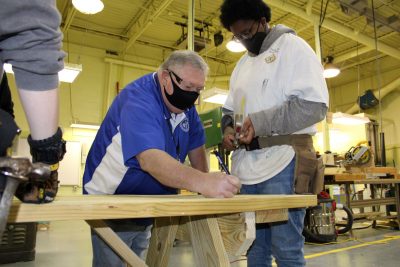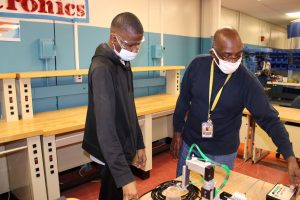District’s CTE programs address workforce need and offer students pathways to college, careers
November 15, 2021Legend Young, who is enrolled in the diesel engine technology program at Richland One’s Heyward Career & Technology Center, is taking courses to follow in the path of his stepfather who drove a semi-trailer truck for a living.
Because of his stepfather, the Dreher High School junior “always found trucks pretty cool, so I like working on stuff like that.”
Students sometimes have trouble making the connection between what they learn in their core classes like English, math and science and the work they will do once they graduate, but it’s not too hard for career and technical education (CTE) students in Richland One to make the correlation since teaching is organized around specific professional fields.
For example, the architecture and construction career cluster includes occupations ranging from architect and electrician to plumber/pipe fitter and insulation worker, with courses that range from Combined Annotation Dependent Depletion (CADD) and Home Systems Technology to economics and chemistry for technologies.
The construction major within the architecture and construction career cluster; the diesel engine technology major within the transportation, distribution and logistics career cluster; and the mechatronics major within the manufacturing cluster are considered critical need areas for student enrollment, according to Dr. Sherry Rivers, principal of Heyward Career & Technology Center. She is hoping to attract enough students to respond to the workforce demand in each of the critical need areas, particularly in manufacturing.
“Because of the numerous manufacturing plants in the Midlands and the focus on manufacturing nationwide, we really are bringing the focus to mechatronics to make sure parents and students are aware that this is a great opportunity,” said Rivers. “We’re making sure we connect students to local industry so that they are not just hearing it from us, but they are hearing professionals say that we really need workers – we need trained employees.”

The critical need clusters are three of 16 offered in the district – Richland One was the first district in the state to offer all 16 career clusters. The 13 other clusters are Agriculture, Food and Natural Resources; Arts, Audio-Visual Technology and Communication; Business, Management and Administration; Education and Training; Finance; Government and Public Administration; Health Science; Hospitality and Tourism; Human Services/Family and Consumer Sciences; Information Technology; Law, Public Safety, Corrections and Security; Marketing; and Science, Technology, Engineering and Mathematics.
The curriculum offers core course options that directly relate to the field of choice in addition to those specific to the major or the students’ professional aspirations.
“Our students are and will continue to be ready for a bright future, obtaining the technical knowledge and skills needed for their chosen professions,” said Rivers. “The staff provides instructions and activities which assist students with additional career skills such as teamwork, leadership, professionalism and communication.”
Each cluster is comprised of career groupings that require similar talents, knowledge and skills for a given major. For example, the three majors in the architecture and construction career cluster are design/pre-construction, construction and maintenance/operations.
Once students declare an area of focus and work toward completing the program, they can earn industry certifications and go on to become productive citizens in their communities and in the workplace. Many of them further their studies in college, said Rivers.
To learn more about Richland One’s CTE programs or Heyward Career & Technology Center, contact Rivers at [email protected] or her administrative assistant, Clifton Anderson, at [email protected].














